17 May2016
By Katrina Sheffield
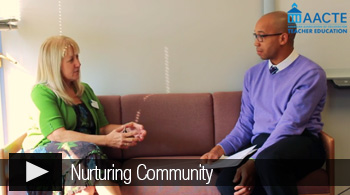
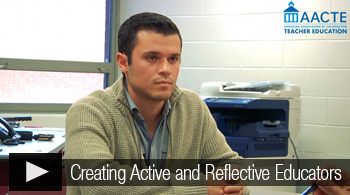
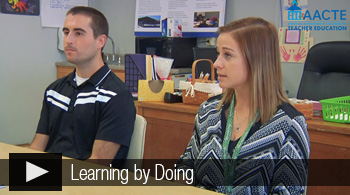
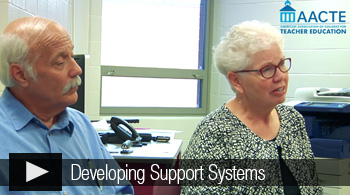
A new set of brief videos in AACTE’s Research-to-Practice Spotlight Series focuses on operationalizing clinical practice through the award-winning partnerships of Ohio University’s Patton College of Education (see this article introducing the series and this overview of the first three videos). Today’s article highlights messages from the next four segments, which feature students and leaders from the college as well as from its partner schools.
The Patton College of Education at Ohio University and its partner schools nurture future teachers with extensive and hands-on experience in classrooms. Teacher candidates play an active role from early in their college years, actively participating and working closely with veteran educators to develop their own proficiency.
16 May2016
By Ena Shelley, Kandi Hill-Clarke and Judy Sheese
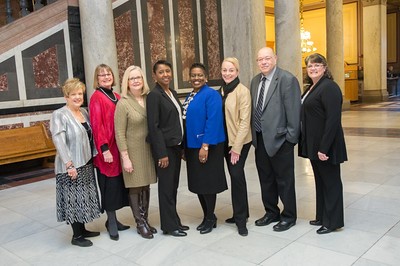
Members of the IACTE Executive Committee at the chapter’s inaugural Day at the Statehouse in February
Last year, the Indiana Association of Colleges for Teacher Education (IACTE) received an AACTE State Chapter Support Grant to fund the creation of a statewide advocacy consortium. In order to disrupt the dominant discourse that negatively portrays teacher education programs, educators, and schools, IACTE sought to collaborate with “partners in practice” to tell positive stories and create a unified message of the education profession. We held a series of productive conversations and meetings, culminating in the capstone experience of the first IACTE “Day at the Statehouse” event in February.
Our partners in this work included the Indiana Association of Public School Superintendents, the Indiana Association of School Principals, the Indiana State Teachers Association, the Indiana School Boards Association, and the education honorary, Kappa Delta Pi.
12 May2016
By Suzie Henderson
The author, assistant principal at Pepperell Elementary School in Lindale, Georgia, is one of several PK-12 educators who presented on their experiences with edTPA and their partnerships with educator preparation providers at last month’s 2016 edTPA National Implementation Conference in Savannah, GA.
Do you want to strengthen relationships between PK-12 administrators and educator preparation faculty? Try going out for lunch.
That’s how the relationship between Pepperell Elementary School, where I’m an assistant principal, and the Shorter University School of Education really took off.
I was at lunch a few years ago with Kristy Brown, who supervises student teaching for Shorter. I told her my staff needed professional development in teaching writing skills to our diverse learners. She said she needed classrooms to host teacher candidates for their clinical experiences.
06 May2016
By Sharon Robinson
I had the honor of attending a half-day conference at the White House last month celebrating the Operation Educate the Educators program, a joint initiative of AACTE and the Military Child Education Coalition (MCEC) to better prepare school personnel to meet the needs of military-connected children.
The April 13 event marked not only the Month of the Military Child but also the 5-year anniversary of Joining Forces, a critical initiative launched by First Lady Michelle Obama and Second Lady Dr. Jill Biden to support military families’ health, education, and employment. Operation Educate the Educators is a key player in the education component, comprising an impressive array of programming at more than 100 AACTE member institutions and others across the country. Biden also spoke on a related panel earlier in the week at the American Educational Research Association conference.
03 May2016
By Melvin Bogard
A new set of brief videos in AACTE’s Research-to-Practice Spotlight Series focuses on operationalizing clinical practice through the award-winning partnerships of Ohio University’s Patton College of Education (see this article introducing the series). Today’s article highlights messages from the first three videos, which feature leaders from the college as well as students, teachers, and administrators from several of its partner schools.
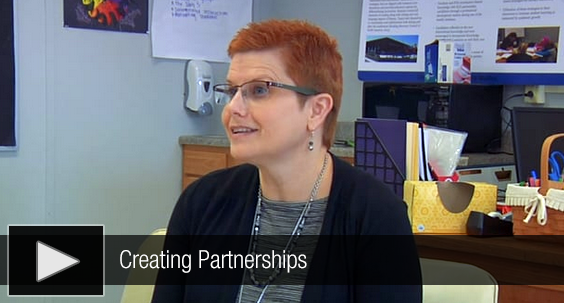
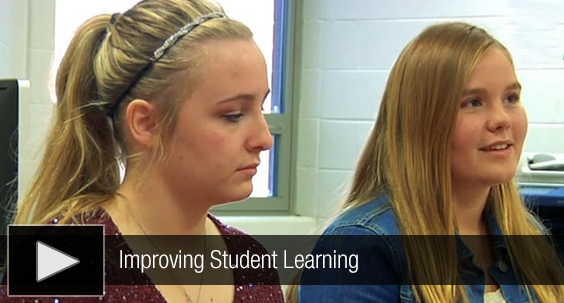
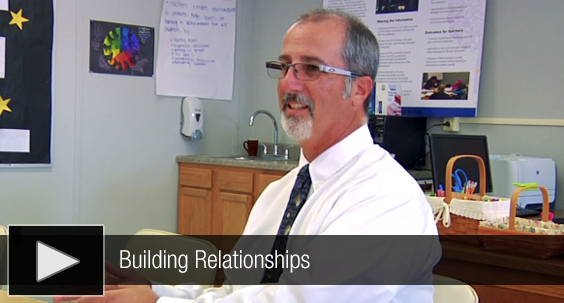
The Patton College of Education at Ohio University is building bridges for greater teaching and learning in a model that is a boon to PK-12 students, faculty, and teacher candidates. Its professional development school (PDS) partnerships employ a clinical model of education to provide hands-on experience for future educators while supporting their mentors and demonstrating educational benefit for the students as well.
02 May2016
By Kristin McCabe
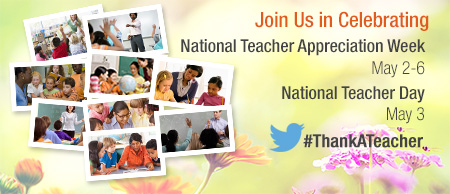 AACTE joins the National Education Association (NEA) and the National Parent Teacher Association (PTA) in celebrating terrific teachers during National Teacher Appreciation Week, May 2-6, and National Teacher Day, May 3.
AACTE joins the National Education Association (NEA) and the National Parent Teacher Association (PTA) in celebrating terrific teachers during National Teacher Appreciation Week, May 2-6, and National Teacher Day, May 3.
Tune in to the White House tomorrow as President Obama recognizes this year’s national and state teachers of the year, and don’t forget to reach out to congratulate any honorees who are alumni of your programs!
How can you get involved in the teacher celebration? In addition to holding events for your alumni or simply thanking teachers in person, here are some easy ways to engage on social media:
26 Apr2016
By Amanda Lester
The AACTE Clinical Practice Commission (CPC) was launched in June 2015 with the goals of establishing a shared lexicon, identifying model protocols and best practices, and developing actionable recommendations for the field to define and align high-quality clinical practice in teacher preparation. The commission’s work is projected to extend through December 2016, but the 68th AACTE Annual Meeting held in February provided an opportunity to share the group’s work to date and gather feedback from the field.
During the conference, members of the CPC presented their vision for clinical practice, built upon a foundation of strong PK-24 partnerships and centered on transforming educator preparation by unifying the profession. Several commissioners provided insight into the CPC’s work as presenters during the preconference event “Preparing Tomorrow’s Leaders Through School-University Partnerships,” sponsored by the Wallace Foundation, and as featured panelists in the major forum “Clinical Practice in Educator Preparation.”
Three members of the CPC, Kristien Zenkov and Audra Parker from George Mason University (VA) and Rene Roselle from the University of Connecticut, spoke at the preconference event. Their presentation summarized the commission’s progress toward developing a white paper and a shared lexicon to connect the essential elements of clinical partnerships. They also discussed the common structures of clinical preparation and the implications that clinical teacher preparation has for advancing clinical practice in principal preparation.
18 Apr2016
By Rodrick Lucero
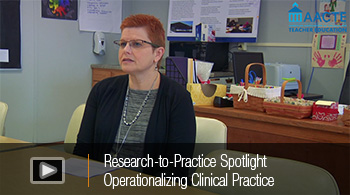 It is my pleasure to introduce the Patton College of Education at Ohio University as the next institution to be featured in AACTE’s Research-to-Practice Spotlight Series. Continuing our focus on effective models of clinical practice, this series highlights the award-winning work of Ohio University’s Patton College and its network of PK-12 partner schools to continuously improve their preparation of teachers in an active interchange of theory and practice.
It is my pleasure to introduce the Patton College of Education at Ohio University as the next institution to be featured in AACTE’s Research-to-Practice Spotlight Series. Continuing our focus on effective models of clinical practice, this series highlights the award-winning work of Ohio University’s Patton College and its network of PK-12 partner schools to continuously improve their preparation of teachers in an active interchange of theory and practice.
Over the next few weeks, we’ll be posting videos and blog articles to share what AACTE staff learned during our recent visit to picturesque Athens, Ohio, where we met with a broad selection of program leaders and participants. It was clear that the clinical practice model resonates with candidates, mentor teachers, PK-12 administrators, and those on the campus because those involved can see the benefits and have a clear understanding of the processes supporting them. The tone of this partnership is one of infinite possibility as all members of the community find themselves involved.
To help introduce this series, I invited Patton College Dean Renée Middleton to reflect on the program’s success and development. Here’s what she had to say:
14 Apr2016
By David Hough
In February, the Louisiana Department of Education hosted representatives from six states in the Council of Chief State School Officers’ Network for Transforming Educator Preparation (NTEP). Formed in 2013, this aligned action network brings together state chiefs and their education agency staff who are committed to activating key policy levers around licensure, program approval, and data as they transform educator preparation in their respective states. As a representative from the Missouri NTEP team, I joined colleagues from five states—Georgia, Massachusetts, New Hampshire, Oklahoma, and Washington—on the visit to Baton Rouge to attend Louisiana’s Believe and Prepare Community Meeting and learn from the work of practitioners, programs, and districts across Louisiana leading efforts to improve educator preparation.
05 Apr2016
By Amanda Lester
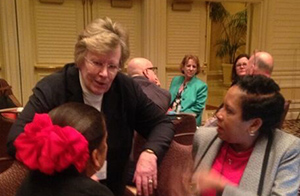
Facilitator Angela Sewall talks with participants in the Wallace-sponsored preconference event
Prior to the start of the 68th Annual Meeting, AACTE hosted a daylong workshop titled “Preparing Tomorrow’s Leaders Through School-University Partnerships Educational Leaders Preconference,” sponsored by The Wallace Foundation. The event was attended by more than 125 PK-12 and higher education leaders from across the nation, including school-university partners who attended together with the goal of strengthening their collaboration in principal preparation programs.
The event agenda featured a series of presentations and interactive PK-24 “table talk” discussions, focused on examining aspects of clinical practice and effective partnerships to advance principal preparation. Participants explored topics such as these:
28 Mar2016
By Rodrick Lucero
 I recently had the opportunity to visit St. John’s University in New York City at the invitation of Dean Michael Sampson. Witnessing a high-functioning clinical partnership in action was both inspiring and reassuring, providing a concrete glimpse into the terrific work being done around the country to prepare high-quality teachers.
I recently had the opportunity to visit St. John’s University in New York City at the invitation of Dean Michael Sampson. Witnessing a high-functioning clinical partnership in action was both inspiring and reassuring, providing a concrete glimpse into the terrific work being done around the country to prepare high-quality teachers.
My visit began at P.S. 101 in Queens, a St. John’s partner school. There, I met with university-based instructor Liz Chase, Department Chair Judith McVarish, Assistant Principals Laura Fahey and Irtis Gonzalez, and Principal Monique Paniagua. The school was bustling with youngsters greeting friends and teachers exuberantly as we made our way to the principal’s office. The joy and laughter filling the hallways showed that the students were excited about being at school.
05 Feb2016
By Sharon Robinson
Have you tried walking around with just one eye open? It’s tough: Your field of vision is limited; your balance suffers; you lack depth perception. Our brains need a variety of signals to bring the world into focus—and of course, this holds true not only for eyesight, but for our comprehension of just about everything.
Educator preparation is no exception. To help us meet the demands of professional practice, we form partnerships that span varying perspectives. One-dimensional views issued from the academy are as unhelpful as those emanating from the state house. But we find meaning and make progress on the tough questions when we tackle them from many angles at once, embracing complexity as an element that is essential to moving forward.
AACTE’s upcoming Annual Meeting—a convening primarily for teacher educators—will bring in these key viewpoints with significant participation from the world of practice and beyond. Beginning with preconference events and running through sessions large and small, this conference will provoke new insights on problems of practice through multidimensional views.
02 Feb2016
By Melvin Bogard and Kristin McCabe
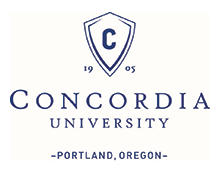 Ed Prep Matters is featuring “Stories of Impact” to showcase AACTE member institutions with educator preparation programs that are making a positive impact in their communities and beyond through innovative practices. We are committed to sharing members’ success stories and encourage you to do the same.
Ed Prep Matters is featuring “Stories of Impact” to showcase AACTE member institutions with educator preparation programs that are making a positive impact in their communities and beyond through innovative practices. We are committed to sharing members’ success stories and encourage you to do the same.
In one of the most impoverished neighborhoods of Portland, Oregon, a flourishing partnership between Concordia University and the PK-8 Faubion School has spawned ambitious plans for a new model of education to help disenfranchised students and the whole community.
01 Feb2016
By Shane P. Martin
The views expressed in this post do not necessarily reflect the views of AACTE.
With the signing of the Every Student Succeeds Act (ESSA) in December 2015, there was an intentional shift in power from the federal government to the states when compared with its predecessor, the No Child Left Behind Act. There is great value in having more autonomy and accountability at the state level, and in many ways California has been ahead of this curve in terms of a strong statewide approach that focuses on local control and multiple measures of effectiveness. Under the leadership of California Commission on Teacher Credentialing Chair Linda Darling-Hammond, the state has forged a new path around program quality and assessment, revising its policies and practices to focus on outcomes instead of inputs. In many ways, this shift anticipated what was put into law with ESSA.
19 Jan2016
By Bahati Banks and Angela Turk
 Ed Prep Matters is featuring “Stories of Impact” to showcase AACTE member institutions with educator preparation programs that are making a positive impact in their communities and beyond through innovative practices. We are committed to sharing members’ success stories and encourage you to do the same.
Ed Prep Matters is featuring “Stories of Impact” to showcase AACTE member institutions with educator preparation programs that are making a positive impact in their communities and beyond through innovative practices. We are committed to sharing members’ success stories and encourage you to do the same.
It’s no secret that Georgia, like many states throughout our nation, struggles to recruit highly qualified teachers committed to serving students in high-need schools in urban and rural communities—especially in math, science, and special education. When you take into consideration the state’s explosive population growth over the last several years, one-third of new teachers leaving the profession within 3 to 5 years, and a large number of retiring teachers, it is imperative that institutions responsible for teacher preparation work together to find a solution to the staffing crisis.















 AACTE joins the
AACTE joins the 

 I recently had the opportunity to visit
I recently had the opportunity to visit  Ed Prep Matters is featuring “Stories of Impact” to showcase AACTE member institutions with educator preparation programs that are making a positive impact in their communities and beyond through innovative practices. We are committed to sharing members’ success stories and encourage you to do the same.
Ed Prep Matters is featuring “Stories of Impact” to showcase AACTE member institutions with educator preparation programs that are making a positive impact in their communities and beyond through innovative practices. We are committed to sharing members’ success stories and encourage you to do the same. Ed Prep Matters is featuring “Stories of Impact” to showcase AACTE member institutions with educator preparation programs that are making a positive impact in their communities and beyond through innovative practices. We are committed to sharing members’ success stories and encourage you to do the same.
Ed Prep Matters is featuring “Stories of Impact” to showcase AACTE member institutions with educator preparation programs that are making a positive impact in their communities and beyond through innovative practices. We are committed to sharing members’ success stories and encourage you to do the same.